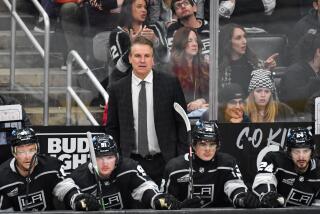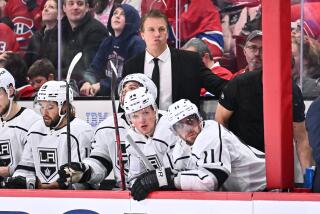Flying High in Philly
- Share via
The clock is ticking on Philadelphia Flyer Coach Ken Hitchcock. And he knows it.
“There’s a certain time frame when the players want discipline, want direction, want you to be able to lead the charge in adjusting,” says Hitchcock, in his first season with Philadelphia.
Now is that time for Hitchcock. His team got off to a hot start and is one of the best in the Eastern Conference, and his job is not in jeopardy. But coaching life spans can cover a few games, two seasons, four or whatever. Hitchcock’s coaching life span depends on what he can get out of his team and for how long. No matter how great its achievements, though, a coaching life span inevitably comes to an end.
After getting fired by the Dallas Stars in January, despite coaching more than six seasons -- which included one Stanley Cup and another trip to the finals -- Hitchcock knows how it works. He will fight to gain the trust of his players. He will teach them his system and get them to believe. Then, they must try to be successful. If, after succeeding, the team stumbles and starts to fall, another process will begin. Ultimately, that process will end when Hitchcock is fired, or he decides to leave.
Thanks to his time with Dallas, Hitchcock can describe not only the progress of a team’s development on the ice but the process of its demise off it.
“There is the climbing up the ladder,” he says. “Then when you get there, there is trying to stay on top. Then there is going down.”
When the team is falling, often the players kick the ladder out from under the coach. Hitchcock didn’t see it coming with the Stars. But after getting fired, he talked to former coaches, and now he has identified a pattern.
“First, [the players] get angry at each other,” Hitchcock says. “Then they get angry at certain individuals on the team. Then they get angry at the coach.”
The last stage of anger is usually the final straw for management. The truth is, the demise of a team starts long before the anger reaches the coach.
“Once you start falling, you start pointing fingers,” says New Jersey Devil winger Jamie Langenbrunner, who played for Hitchcock with the Stars. “You start saying, ‘The team shouldn’t have done this’ or ‘shouldn’t have signed this guy.’ Then the coach is too hard. As soon as you point one finger, it’s over. Looking back on it, that’s exactly what we did. We imploded.”
Hitchcock was sent away with a reputation for being too negative, for sucking the life and fun out of the game. But Langenbrunner says that’s not an accurate description.
“He’s demanding, but he’s fair,” Langenbrunner says. “He asks you to play hard and play smart. He’s a very big competitor, and he’s going to do everything in his power to win.”
At first, those are qualities the players need. They need the energy from their coach. They want to be told where to go and what to do on the ice. They listen only as long as those directions result in success. With Philadelphia, Hitchcock’s coaching has brought success, and that success has brought him disciples in a fickle Flyer locker room. The players are listening.
Right now, it’s all for one and one for all. Jeremy Roenick and Keith Primeau and Mark Recchi and Roman Cechmanek and Hitchcock -- arms linked in a singular pursuit. So far.
“I was excited right from the moment that I heard [Hitchcock was hired] because I knew that he was going to bring an element that we hadn’t had here,” Roenick said in a recent conference call, during which he also denied rumors he didn’t want to play for Hitchcock. “He’s a guy that’s going to come in and take charge and who was going to really instill a system we feel can bring us to a championship.”
It’s the same system he used with the Stars, and he’s instilling it in the same way, but the method is getting no complaints. At the moment.
“Hitch just takes things to the bitter, bitter, ultimate detail of everything,” Roenick said, laughing. “He’ll even tell you which way your skates should be pointed in the neutral zone when checking somebody.”
The Flyers are happy they are being forced to focus their efforts, and it shows in their solid play as a unit.
“We try to move up and down the ice as a group of five,” Hitchcock says of his system. “We’re either all up or all back.”
Hitchcock describes these Flyers as “a good team trying to be a great team.”
“We’re having fun and playing hard,” he says. “We have a lot to learn, but we’re willing to dig in.”
Hitchcock is in control now. That’s how the players want it. When they change their minds, when they point that first finger, his hourglass is empty. It’s inevitable. Hitchcock must make the most of his time while the sand still is falling.
More to Read
Go beyond the scoreboard
Get the latest on L.A.'s teams in the daily Sports Report newsletter.
You may occasionally receive promotional content from the Los Angeles Times.










